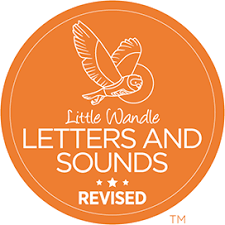Phonics
Since 2010, the UK government has sought to embed the teaching of phonics in all primary schools and in 2021 updated the way in which it validated a number of ‘Systematic Synthetic Phonics’ (SSP) teaching programmes. Our chosen scheme ‘Little Wandle’, developed by a South London teaching school, was approved for use and we began using it across our schools from September 2021.
Development of phonics skills
Pupils begin in EYFS by being taught phonics as well as being encouraged to take on the role of ‘the reader’ in school by emulating how skilled Early Years practitioners read aloud. During this stage there is a lot of talking between child and adult about what is going on in the book – the earliest stage of comprehension. Pupils are able to retell stories using role play and enjoy whole class shared reading and being read to by adults. Favourite books may be read many times over.
As pupils move into Key Stage One, the teaching of reading strategies continues alongside a systematic approach to phonics. We use the ‘Little Wandle’ phonics programme and parents can get an understanding of how this works by following this link. We have timetabled phonics sessions every day for children of this age and there is an assessment of progress in Year 1.
Alongside the systematic phonics work undertaken in the EYFS and KS1 there is a focus on fluency and the reading of high frequency and common exception words. Comprehension skills are explicitly taught through a variety of texts used in class that include fiction, non-fiction and poetry.
During Key Stage Two, children’s comprehension skills are further developed through the teaching of new vocabulary in context. Pupils are taught the skills of retrieval, use of prior knowledge and inference through whole class reading sessions that use a wide variety of challenging and interesting texts.
-
Read More
Curriculum Home
Details of all the National Curriculum subjects taught at Pegasus schools and curriculum Long Term Plans for each year group.
-
Read More
Phonics & Reading
We provide a reading rich environment where children have access to a range of quality texts.
-
Read More
Writing & handwriting
Our aim is to ensure that all children reach a high standard of literacy by equipping pupils with a strong command of the written word.
-
Read More
Spelling & Grammar
How we work with pupils from early years education through to Key Stages 1 and 2.
-
Read More
Mathematics
We follow the National Curriculum and The Early Years’ Foundation Stage Curriculum for mathematics and teach maths daily.
-
Read More
Religious Education
We develop positive attitudes and values such as self-esteem, a respect for others and their beliefs and an appreciation of the natural world.
-
Read More
Thematic Curriculum
History, geography, art and design technology (DT) are combined into themed work which is more meaningful to the children.
-
Read More
PE and swimming
Physical Education forms an essential part of the curriculum at The Pegasus Academy Trust.
-
Read More
MFL (Modern Foreign Languages
At Pegasus we have chosen to teach either French or Spanish (at KS1) as our Modern Foreign Languages














